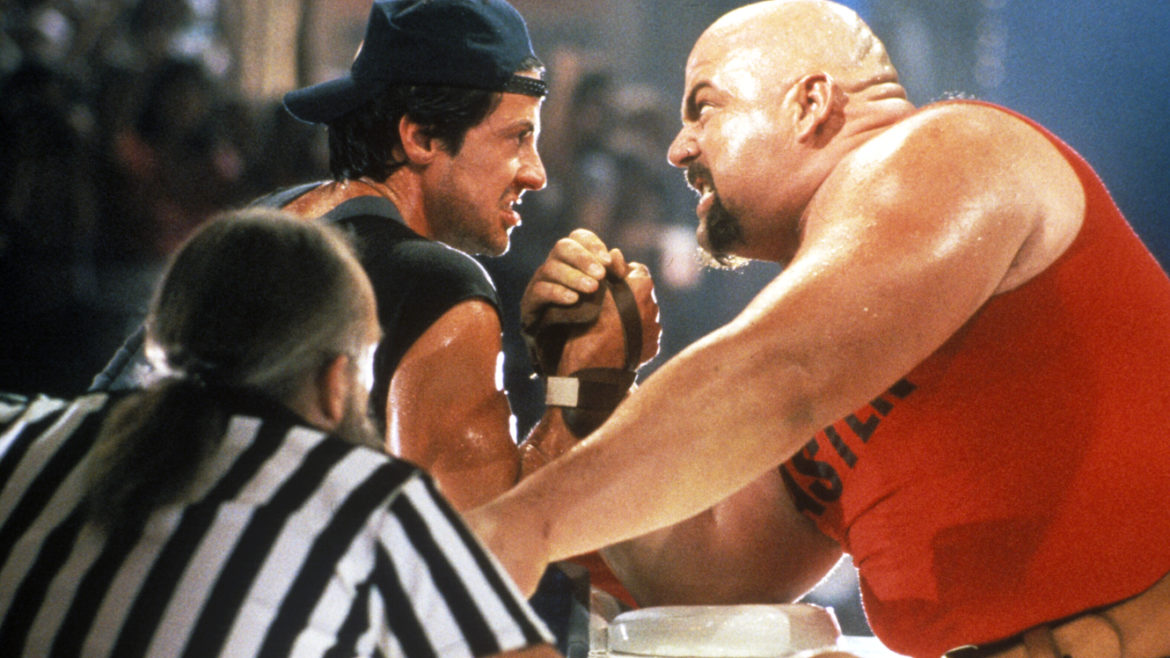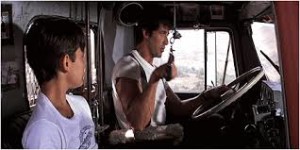It is a paradox, an enigma wrapped inside of a riddle, then stuffed, turducken-style, into a joke. It’s an arm-wrestling movie – an arm-wrestling movie – that spends most of its time trying to generate pathos out of a father-son relationship built around big-rigs. The father (Sylvester Stallone) is a doofy galloot. The son (David Mendenhall) is a preening, constantly whining goober who any reasonable person would abandon at the next truck-stop. The problems the duo face don’t seem to mimic anything ordinary people encounter, despite the film’s urgent insistence that they are the salt of the earth. Nothing makes any sense.
For the record, here is the plot.
We are introduced to two characters: Michael Cutler, a pre-teen kid graduating from military school (but the kind of rules-following child who won’t toss his hat in the air, because of … I don’t know. Because of dirt, I guess? The gross dirt of the underclass?) and Lincoln Hawk, a truck driver who, it appears, likes to wash his truck, because of … I don’t know.
Hawk shows up at Michael’s graduation, much to Michael’s chagrin. Turns out he’s the estranged dad. The two of them travel to go see Michael’s mom, who is dying of a cancer-like, but never specific, disease, and wants them to bond, big-rig-style.
Michael is a pain in the ass, occasionally leaping into traffic, but eventually warming to Hawk’s way of living, via Kenny Loggins workout montages. As fate and extraneous plot development would have it, Hawk is also an amateur arm wrestler, a trade Michael (rightly) finds absurd, but he eventually discovers that arm wrestling is a means of self-fulfillment and honor. He finds this by being cajoled into arm-wrestling some idiots in a truck stop, on top of a pinball machine. The scene aims at something liberating, and doesn’t come close.
Moments later, he’s briefly kidnapped by the incompetent henchmen of Robert Loggia, fresh out of Scarface and the tanning salon, who is Michael’s rich grandfather, and holds an unreasonable grudge against declasse Hawk. The two reunite, but in the meantime, Michael starts to think maybe he shouldn’t hang out at truck stops so much with his weird arm-wrestling dad – frankly, a well-supported position. In response, Hawk drives his truck through his father-in-law’s gate, over his fountain, and literally into his house, before being reminded that this is a bad way to get custody of your kid.
He retreats, but vows to win the day … namely, by being the best arm-wrestler in a competition in Vegas, which boasts not just a cash prize but a new truck, which is convenient, given the whole “wrecking your truck as you crash into a house” plot that just happened.
It looks like all is lost in Vegas. These guys are tough, man. But, because Hawk taught his kid how to drive, Michael steals a car and heads straight for the arena, just in time to give a speech to his wayward dad about not giving up. As it’s a double-elimination tournament – a fact Over The Top is almost insanely committed to underlining for viewers – there’s still time. Will Hawk win? Will the family triumph? Have you ever seen a movie?
If Over The Top sounds like a movie invented on the fly, built on familiar tropes but with arm-wrestling incongruously inserted, you might be on to something.
Stallone received $16 million for the performance, paid out by Cannon Films’ Menahem Golan and Yoram Globus, who apparently thought this was what audiences craved. Audiences did not crave this, and Over The Top was one of several nails in the coffin of the Israeli cousins’ empire. The film marked the first, but not the last, example of Cannon’s profound over-reach. The filmhouse that gave us Breakin’ and all the Death Wish sequels had met its match. That match was selling big-budget, and incredibly uncinematic, depictions of arm-wrestling, a “sport” no one (outside of deeply involved insiders) cared much about. Golan and Globus would try this again with the lambada a few years later, after their split. Again, audiences side-eyed these attempts to generate interest in fads that existed pretty much only in the minds of the films’ producers.
It is difficult to pinpoint the exact moment that Over The Top becomes its own parody. The workout scene is a good nominee – the gate-crashing also works, as does Michael running across lanes of traffic, presumably killing dozens – but I’d also suggest the voiceover from the arena announcer, as Hawk prepares to enter the fray in Vegas. That man says, “Arm-wrestling is a feat of speed, strength, and skill.” This is among the greatest lies sports movies have ever conveyed with a straight face. You can argue all you want for the legitimacy of arm-wrestling as a sport, but there is just no way that it’s a feat of speed. That man is wrong.
Why, then, is the movie so fun? It has no right to be. But, as one of the few Golan-directed entries in the Cannon canon (sorry about that), it is governed by a kind of lunatic conviction.
Towards the end of the film, before the big showdown, Golan cuts to each of the individual arm-wrestlers, in faux-documentary takes. The lines are amazing. Stallone explains how turning his cap backwards makes him a different person when he arm-wrestles. His nemesis “Bull” Hurley boasts that “I drive truck, break arms, and arm wrestle. It’s what I love to do, it’s what I do best.” The one Black guy, named (kind of racistly) Harry Bosco, says, “My whole body is an engine. This is a fireplug… and I’m gonna light him up.” You may notice, upon reflection, that this last quote makes absolutely no sense. So it goes, in the world of Over The Top.
I haven’t even touched on how the film can’t decide if Stallone is called “Hawk” or “Hawks”, but, at a certain point, it just feels like piling on. Over The Top is an idiot fantasy, a movie for children and those who always wanted to work out on the side of the road with Sylvester Stallone while Kenny Loggins scored your muscle-bound dream. It succeeds on some reptilian-brained level, and survives to this day as a testament to what you can achieve if you adamantly refuse to examine anything but the surface.
That’s a kind of triumph, right? Like a guy who wins a truck in Vegas through the speed of his arm-wrestling, to win the heart of the kid he abandoned when he opted to focus on driving trucks. The world, as we are reminded twice, won’t meet you halfway. You got to take it.


